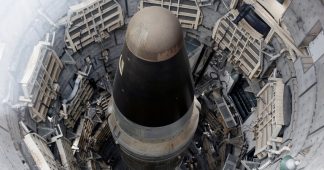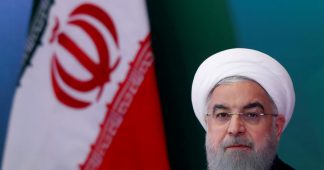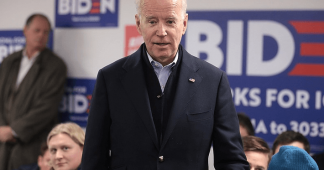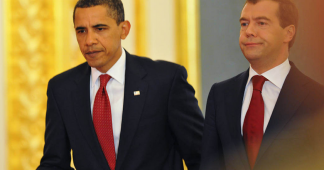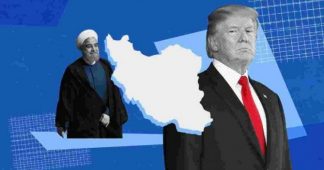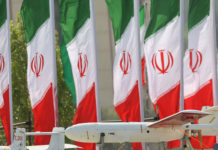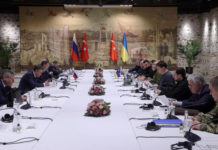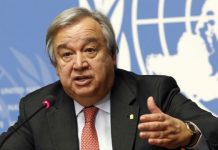By Dimitris Konstantakopoulos
It took something more than three months after Donald Trump took office in order to prove he wasn’t what he wanted us to believe he was.
In April 2017, this supposed “adversary of Obama wars” and “Russia’s friend” ordered the bombing of Syria, where Russian forces were stationed. Then he sent his Secretary of State Rex Tillerson to the Russians to tell them “either with us or with Assad.” This was followed by the threats of annihilating North Korea, the communication – political “legitimization” of the nuclear threat, the unilateral withdrawal from the Iran deal, the abolition of nearly all agreements with Russia on nuclear arms control, a ferocious program of modernization of US nuclear weapons, the characterization of Russia and China as the main opponents of America, the trade war against China, the imposition of sanctions to dozens of countries of the planet, the policy of acceleration of climate change, while, in the Middle East, Trump has proved, beyond doubt, that the slogan “America first” meant “Israel first”. Three or four times we approached an all-out war in the Middle East.
The fact there are still people believing Trump was an “anti-war”, “anti-systemic” politician, is overwhelming us and we are not going to discuss it. One of the most fundamental human rights and probably the most difficult to suppress is the right to make mistakes, even serious ones, and then insist on them. Some people even argue that what Trump has really done, in “real reality”, does not matter much, since the Third World War did not happen after all. Not reacting to policies that potentially lead to a nuclear conflict has several advantages indeed. You don’t mess with the Americans and NATO, but you can also say, as long as the war doesn’t happen, that you were right and confirmed by events. If a nuclear war finally happens, there will be no one to tell you that you were wrong.
The worst that Trump did was to introduce an element of insanity, irrationalism and immorality, and also a cult of power without pretexts and excuses, into American ideology. This casino boss attacked in fact the last remnants of bourgeois democratic culture in the United States and, more generally speaking, the last remaining achievements of the modern era of human civilization. And this is exactly what you should do if you are planning a Great War (for example against Russia or China). War remains, even in our era, “the continuation of politics by other means”.
The “never ending wars” are compatible, even if only barely, with the remnants of American democracy. “Cataclysmic” wars require a radically different ideology, as the launching of the 2nd World War has also required. The historical mission fulfilled by the sui generis far right and Trump’s insane style was the ideological, political preparation of “cataclysmic wars”. In this connexion, an element of irrationalism is easily discerned also in all classic Far Right movements. It was very pronounced for example in Mussolini’s fascism.
A bad vs. a very bad choice
If Trump’s policies had been supported by US voters last November, we would have run a very high risk of disasters of global consequences, given his ecological, Middle Eastern and nuclear policies and his ideology (or lack of it). That does not mean we are not facing such threats under Biden: simply that with him there is an element of rationalism. And this was a reason many people in the US supported Biden, not because they liked him, but because they were frightened by Trump, and to “choose an enemy,” as Sanders once put it.
Certainly, one would be completely unrealistic to hope Biden ever had any chance of being a kind of Roosevelt or Kennedy. His was a bad versus a very bad choice. And, by the way, US capitalists backed him massively only after Sanders’ defeat.
In general, the tendency towards generalized war against everybody (Islam, Russia, China, the poor, culture or Nature) is a key characteristic of capitalism of our time, for deep structural, organic reasons and not out of a personal vice of a President. But there are also great and important differences between representatives of capitalism, as there have been in the past, for example between Hitler and Churchill.
This is also a reason the supposed Western left is committing “suicide”, to the extent that it is adopting the justification of imperialist interventions with arguments of human rights and democracy, those interventions destroying, not helping in any way democracy and human rights (Iraq, Libya, Syria and dozens of other countries of the planet provide us with telling examples). You don’t need even to go to the South to discover the relationship between democracy, human rights and capitalism. The ferocious repression of a majority social and political movement like the Yellow Vests by the French state is enough to prove our point.
Biden’s contradictions: from renewing START to attacking Putin
Biden began his term with two very important and progressive steps. First, it brought the US back into the Paris climate agreement, even if the agreement itself is insufficient to stop the global climate catastrophe. Much more is needed.
Second, Biden called Russian President Vladimir Putin and they agreed an immediate extension of the START Treaty on strategic nuclear weapons for five years. This treaty was the last one remaining out of a complex of nuclear arms treaties Americans (and in particular the “pacifist” Trump) demolished after the “end” of the Cold War.
On the Iranian issue, of enormous international significance, Biden has until now insisted he wants to return to the agreement on its nuclear program, but he has put a lot of water in his wine, under pressure from the Israeli lobby, so it is doubtful what will happen in the end.
But the whole atmosphere in international relations and in particular in US-Russian (and subsequently US-Chinese relations) changed abruptly when Biden attacked Putin, by calling him a “killer without a soul” when speaking to ABC (and then with the Blinken’s campaign against China and Russia 0which followed). The Biden’s statement in particular was all the more striking because the President himself, although he has changed his views many times, benting every time to the winds blowing in Washington, he has still demonstrated a remarkable steadfastness in strongly supporting three things throughout all his political career:
– the need to maintain good communication between the leaders of the nuclear superpowers,
– the need to maintain “strategic stability” and
– the policy of “no first use ” of nuclear weapons. He even rushed, after saying this about Putin, to remind Stephanopoulos that he had called the Russian President, that they had agreed to sign the START, and that he had done that for the sake of the good of all Mankind, which is above anything else.
Predictability, strategic stability, no first use
Understanding, especially after their experience during the Cuban Missile Crisis, that a global nuclear war is both possible and unwinnable, Americans concluded that good communication, strategic stability and a policy of no first use are badly needed. These have been the foundations of the arms control system.
Of course, there have always been in the Western capitalist Empire extremists who have never accepted such things, as for example the Committee on the Present Danger and the magazine Commentary, the ancestors of the neoconservative architects of the “war of civilizations ” in general and of the invasion of Iraq in particular (Huntington, Perle, Cheney, Wolfowitz, Netanyahu, Nuland etc.). Today, we are witnessing the emergence of the fourth (anti-Chinese now) generation of new, post-Cold War “Cold Warriors” (!!!), created in March 2019, under the name “Committee on the Present Danger: China” (CPDC), in close collaboration with former Under-Secretary of State Frank Gaffney and, as usual, Trump’s strategist, former Goldman Sachs banker and former US Navy officer Steve Bannon.
In today’s technological environment, the need for predictability and strategic stability is even greater than what it was during the first Cold War. We should also add at this point that Biden has chosen a very progressive group of advisers on the issues of nuclear arms control, a group which seems to wish “rebuilding ” the structure of nuclear arms control and also to revise the monstrous program of modernization of US nuclear weapons launched under Trump. What this team will be able to achieve remains of course unpredictable. It is much easier to tear down than to build, and as for the US military-industrial complex, it is a monster that hardly accepts any cuts. During Obama we also saw the Neocon extremists emigrate from Washington to Paris and use France as their base of operations, for example to launch the attack on Libya. One wonders if they have not already encouraged Johnson, also of the Trumpian International, even if he does not claim it so loudly nowadays, to begin the Trident modernization, in order to recompense for any slowing down of US nuclear development.
But when you call the leader of the rival nuclear superpower a “killer without a soul,” if you’re not actually declaring war on his country, as a minimum you’re undermining any mutual respect and credibility, on which is based any good communication. We do not know whether Biden really wanted to make this statement, or whether it was imposed on him by the “superior powers” of the Empire or by the outrageously anti-Russian political atmosphere in the United States.
What we do know is that by saying what he said about Putin, Biden has already undermined the policy he wants to pursue in the area of nuclear weapons, but also in the Middle East, where he absolutely needs Moscow’s cooperation if he wants to carry out what he promised.
He has also done something else . By undermining his communication channel with the leader of Russia, he has given space to the extremists of the Empire to organize provocations in the Ukraine and/or the Middle East, which could lead Biden himself to directions completely different from those he probably would like to follow and would undermine his most progressive elements of policy.
